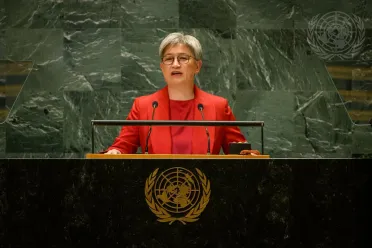Statement
Statement summary
PENNY WONG, Minister for Foreign Affairs of Australia, said that UN rules matter, “never more so than in times of conflict — when they help guide us out of darkness, back towards light. Back on a path towards peace, stability and prosperity.” Israel must comply with the binding orders of the International Court of Justice, she said, and shared the frustration of most Member States that the Palestinian State still does not exist over 77 years since the Assembly adopted resolution 181. “We must all contribute new ways to break the cycle of conflict,” she said. “Australia wants to engage on new ways to build momentum, including using the Council to set a pathway for two States, with a clear timeline for the international declaration of Palestinian Statehood.” The world’s peoples are counting on Member States to rededicate themselves to international humanitarian law and other laws meant to preserve peace and security.
She noted the Russia Federation continues its vicious assault on Ukraine’s people and sovereignty, and it ended the mandate of the Security Council’s Panel of Experts on the Democratic People’s Republic of Korea after 14 years of unanimous support. The Democratic People’s Republic of Korea continues its unlawful activities with impunity, conducting illegal arms transfers to the Russia Federation and threatening the Asia-Pacific region, including the Republic of Korea and Japan. The Russian Federation is sharing nuclear and space information and technology with Iran. “Rules are being blurred, undermined, and at times, blatantly violated,” she said. “We must rally to defend these rules that protect all of us; these rules that form the character of the world that we want.”
Australia holds a vision for the world in which no country dominates and no country is dominated. “When disputes inevitably arise, we insist those differences are managed through dialogue, and according to the rules, not simply by force or raw power,” she said. Canberra has consistently pressed China on peace and stability in the South China Sea and Taiwan Strait and welcomes the resumption of leader and military-level dialogue between the United States and China. “These rules are not a Western construct,” she said, adding that the Asian-Pacific region has used international law to pursue peaceful ways to resolve disputes. Australia’s candidacy for a non-permanent Council seat for the 2029-2030 term reflects its deep commitment to contribute to peace and security. The Council needs reform, she said, calling for greater permanent and non-permanent representation for Africa, Latin America and the Caribbean, and the Asia-Pacific. “This body must represent the world as it is in the twenty-first century,” she said.
Turning to the 2030 Agenda, she noted over one third of the SDGs are stalled or regressing and financing targets are not being met. The global financial architecture must be strengthened and to do so, Australia is backing the multidimensional vulnerability index and the Bridgetown Initiative. “This is why Australia is championing reforms that make multilateral development banks more responsive to global shocks, and build sustainability and resilience, particularly in the smallest and most vulnerable countries,” she said. This year, Canberra committed Australian $492 million to the Asian Development Fund, working with Japan to unlock a record $5 billion in new assistance to the region’s most vulnerable countries over the next decade. Financial pressures are further strained by the trend of trade being used as a point of leverage rather than an opportunity, as economic interdependence is misused for strategic and political ends. “We must keep working together to uphold these trade rules that underpin our economic growth and the livelihoods of our peoples,” she said.
Full statement
Read the full statement, in PDF format.
Photo

Previous sessions
Access the statements from previous sessions.
